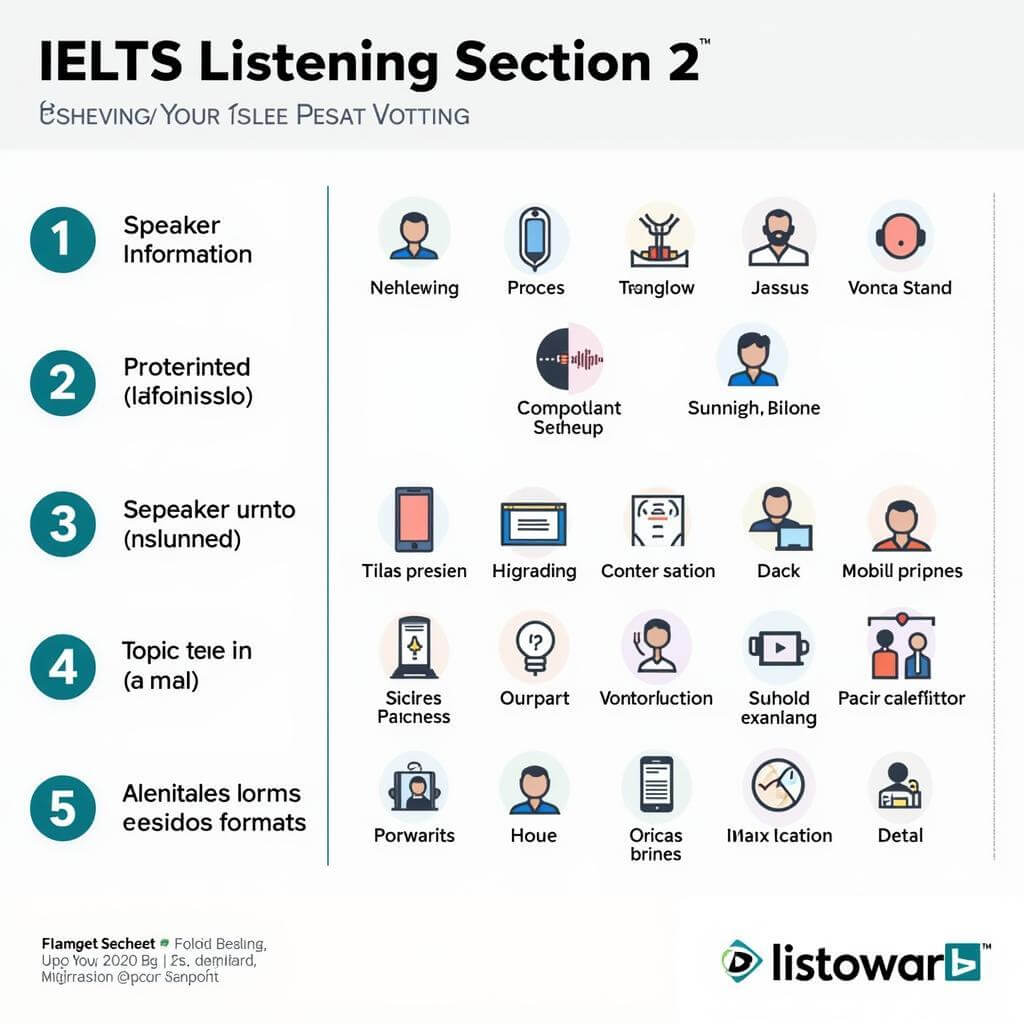IELTS Listening can be a challenging component of the test, especially when it comes to recognizing shifts in speaker focus. As an experienced IELTS instructor, I’ve helped countless students improve their listening skills and achieve their desired scores. In this comprehensive guide, we’ll explore effective strategies for identifying and adapting to changes in speaker focus, ensuring you’re well-prepared for the IELTS Listening test.
Nội dung bài viết
- Understanding the Importance of Recognizing Shifts in Speaker Focus
- Why Shifts in Speaker Focus Matter
- Key Strategies for Recognizing Shifts in Speaker Focus
- 1. Listen for Transition Words and Phrases
- 2. Note Changes in Tone and Intonation
- 3. Identify Speaker Roles and Perspectives
- 4. Practice Active Listening and Note-taking
- 5. Anticipate Potential Shifts
- Practical Exercises to Improve Your Skills
- Common Pitfalls to Avoid
- Integrating Shift Recognition with Other IELTS Listening Skills
- Conclusion
- Frequently Asked Questions
- How often do shifts in speaker focus typically occur in IELTS Listening tasks?
- Can recognizing shifts in speaker focus help with other parts of the IELTS test?
- How can I improve my concentration to better recognize shifts in focus?
- Are there any specific IELTS Listening question types where recognizing shifts is particularly important?
- How can I practice recognizing shifts in speaker focus if I don’t have access to official IELTS materials?
Understanding the Importance of Recognizing Shifts in Speaker Focus
Recognizing shifts in speaker focus is crucial for success in the IELTS Listening test. This skill allows you to follow conversations accurately, identify key information, and avoid common pitfalls that can lead to incorrect answers. By mastering this technique, you’ll be better equipped to handle the various question types and scenarios presented in the test.
Why Shifts in Speaker Focus Matter
- Accurate information tracking: As speakers change topics or perspectives, vital details may be introduced or modified.
- Context understanding: Recognizing shifts helps you grasp the overall context and purpose of the conversation.
- Improved prediction skills: Anticipating changes in focus allows you to prepare for new information.
- Better answer selection: Understanding speaker transitions aids in identifying correct responses to questions.
Key Strategies for Recognizing Shifts in Speaker Focus
To excel in recognizing shifts in topic quickly, implement these proven techniques:
1. Listen for Transition Words and Phrases
Pay close attention to words and phrases that signal a change in topic or perspective, such as:
- “However”
- “On the other hand”
- “In contrast”
- “Moving on to”
- “Let’s consider”
- “Turning our attention to”
These linguistic cues often indicate that the speaker is shifting focus or introducing a new idea.
2. Note Changes in Tone and Intonation
Speakers often adjust their tone or intonation when transitioning to a new topic or expressing a different viewpoint. Focusing on tone changes can help you identify shifts in focus more easily.
- Rising intonation may signal a new question or topic introduction.
- A pause followed by a change in speaking pace could indicate a shift in focus.
- Emphasis on certain words might highlight a new important point or perspective.
3. Identify Speaker Roles and Perspectives
In conversations involving multiple speakers, understanding each participant’s role and perspective is crucial for recognizing shifts in focus.
- Pay attention to introductions or context clues that reveal speakers’ roles or expertise.
- Notice when a new speaker enters the conversation, as this often signals a change in topic or perspective.
- Be aware of contrasting opinions or viewpoints expressed by different speakers.
 IELTS Listening Note-taking for Shifts in Focus
IELTS Listening Note-taking for Shifts in Focus
4. Practice Active Listening and Note-taking
Developing strong active listening and note-taking skills is essential for recognizing shifts in speaker focus.
- Focus on key words and main ideas rather than trying to transcribe everything.
- Use abbreviations and symbols to quickly jot down important points.
- Organize your notes visually, using columns or mind maps to represent different speakers or topics.
- Leave space in your notes to add information as the conversation progresses.
“Active listening is not just about hearing words; it’s about understanding the flow of ideas and recognizing when that flow changes direction,” says Dr. Emily Chen, IELTS Speaking and Listening Expert.
5. Anticipate Potential Shifts
As you become more familiar with IELTS Listening tasks, you’ll start to recognize patterns in how conversations and monologues are structured. Use this knowledge to anticipate potential shifts in focus.
- In academic lectures, speakers often move from general concepts to specific examples.
- In discussions, participants may alternate between presenting arguments and counterarguments.
- In problem-solving scenarios, speakers typically transition from describing an issue to proposing solutions.
By anticipating these shifts, you can mentally prepare yourself to absorb new information more effectively.
Practical Exercises to Improve Your Skills
To enhance your ability in recognizing shifts in speaker focus, try these exercises:
-
Listen to podcasts or radio shows featuring panel discussions. Practice identifying when the topic changes or when a new speaker takes the floor.
-
Watch debate programs and focus on tracking the back-and-forth exchange of ideas between participants.
-
Practice with IELTS Listening sample tests, paying particular attention to sections with multiple speakers or longer monologues.
-
Record yourself and a friend having a conversation on various topics. Listen back and try to identify the points where the focus shifts.
-
Transcribe short segments of IELTS Listening practice tests, noting where and how speakers transition between topics.
 IELTS Listening Practice Exercises for Focus Shifts
IELTS Listening Practice Exercises for Focus Shifts
Common Pitfalls to Avoid
When working on recognizing speaker’s changing topics, be aware of these common mistakes:
- Fixating on unfamiliar words instead of focusing on the overall message
- Losing concentration after hearing the answer to a question, potentially missing a shift in focus
- Failing to distinguish between relevant new information and unimportant details
- Overlooking subtle transitions in monologues or academic lectures
“The key to success in IELTS Listening is not just understanding individual words, but grasping the dynamic flow of information and ideas,” advises Mark Thompson, Senior IELTS Trainer at Cambridge English.
Integrating Shift Recognition with Other IELTS Listening Skills
Recognizing shifts in speaker focus is just one aspect of IELTS Listening success. To maximize your performance, integrate this skill with other crucial techniques:
- Combine shift recognition with identifying shifts in argument to better understand complex discussions.
- Practice how to enhance focus during group discussions in IELTS listening to improve your overall comprehension.
- Use your improved awareness of topic shifts to better predict and locate answers in the question paper.
Conclusion
Mastering the art of recognizing shifts in speaker focus is a game-changer for IELTS Listening success. By implementing the strategies and exercises outlined in this guide, you’ll develop a keen ear for transitions in conversations and lectures. Remember, consistent practice and active engagement with various listening materials are key to improving this critical skill. As you continue to refine your ability to recognize shifts in speaker focus, you’ll find yourself more confident and better prepared for the IELTS Listening test.
Frequently Asked Questions
How often do shifts in speaker focus typically occur in IELTS Listening tasks?
Shifts in speaker focus can occur frequently, especially in sections 3 and 4 of the IELTS Listening test. On average, you might encounter a significant shift every 30-60 seconds, though this can vary depending on the specific task and speakers involved.
Can recognizing shifts in speaker focus help with other parts of the IELTS test?
Yes, this skill can be beneficial in the IELTS Speaking test, helping you to follow the examiner’s questions and shift topics smoothly. It can also aid in the Reading test by improving your ability to track changes in focus within written passages.
How can I improve my concentration to better recognize shifts in focus?
Practice mindfulness techniques, take regular breaks during study sessions, and gradually increase the length of your listening practice. Also, ensure you’re well-rested and hydrated before practicing or taking the actual test.
Are there any specific IELTS Listening question types where recognizing shifts is particularly important?
Recognizing shifts is crucial for multiple-choice questions, matching exercises, and completing notes or summaries. It’s especially important in tasks where you need to identify speakers’ opinions or the progression of an argument.
How can I practice recognizing shifts in speaker focus if I don’t have access to official IELTS materials?
Utilize free online resources such as podcasts, TED Talks, and news broadcasts. Focus on content with multiple speakers or in-depth discussions on various topics to simulate the complexity of IELTS Listening tasks.


